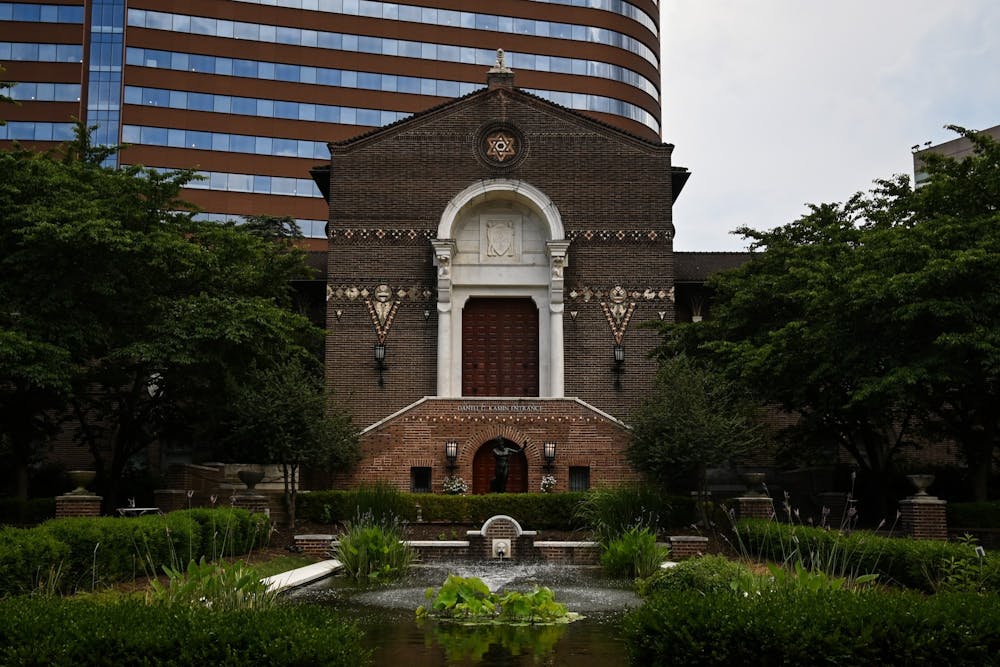
Members of MOVE rejected the Penn Museum's apology at a news conference on Monday.
Credit: Kylie CooperThe Penn Museum apologized to members of MOVE and the University community for its possession of the remains of two children killed in the 1985 MOVE bombing, rather than returning the remains to the Africa family.
The remains were previously in the custody of now-retired professor Alan Mann, who obtained the remains from the city in 1985 as part of an investigation to identify them and later studied the remains with Janet Monge, curator of the Penn Museum's physical anthropology section, BillyPenn reported, before taking them with him to Princeton University. The remains, a pelvic bone and a femur, were transferred back and forth from Penn to Princeton for over 35 years.
“The Philadelphia community has experienced profound emotional distress as a result of the recent news that the remains from the horrific 1985 bombing of the MOVE house had been given by the City Medical Examiner’s Office to the Penn Museum for purposes of identification, and that the remains have continued to be kept at the Museum,” the Monday statement reads.
The Penn Museum also stated it is working on a resolution to return the remains, and promised to reassess its “practices of collecting, stewarding, displaying, and researching human remains.”
Penn President Amy Gutmann and Provost Wendell Pritchett also released a statement on Monday afternoon calling the obtainment of these remains “insensitive, unprofessional, and unacceptable."
"We were profoundly disturbed to learn this past week that human remains, provided to a faculty member by the medical examiner many decades ago in an effort to identify a victim from the 1985 bombing of the MOVE house, had been kept at the Penn Museum for much of that time," the statement read.
Gutmann and Pritchett also announced the University hired attorneys from the Tucker Law Group to investigate how the Penn Museum came in possession of the remains.
According to The Philadelphia Inquirer, members of MOVE — a Black liberation advocacy group whose home on Osage Avenue in West Philadelphia was bombed by the Philadelphia city government in 1985 — rejected the Penn Museum's apology at a news conference on Monday. The attack had killed 11 people, including five children, and destroyed over 60 homes in the neighborhood, BillyPenn reported. A forensic anthropologist hired by the MOVE Philadelphia Special Investigation Committee identified some remains as belonging to a 12-year-old victim known as Delisha, and a 14-year-old victim known as Tree.
MOVE members accused the City of Philadelphia and the Penn Museum of mishandling the remains of at least one child who died in the bombing, the Inquirer reported. The MOVE family is also demanding the immediate return of the remains, an apology from Princeton and Coursera, which displayed the remains in an online course, as well as financial reparations and the termination of Monge from her roles at the Penn Museum and the Anthropology Department.
They are also demanding that the University create a transparent public investigation, approved by their community, to investigate how the remains ended up in the Penn Museum’s possession.
The remains were most recently displayed in an online instruction video for Coursera in a Princeton course series titled "Real Bones: Adventures in Forensic Anthropology." In the video, Monge and an undergraduate student examine the remains and attempt to determine the age of the bones. The video has been removed from Coursera as of earlier this week.
Whereabouts of the remains are currently unclear, but Penn Museum Director Christopher Woods told The New York Times the remains were sent to Mann last Sunday.
The Penn Museum has received criticism from West Philadelphians such as Abdul-Aliy Muhammad, who wrote an op-ed for the Inquirer on April 21 criticizing the Penn Museum for holding the remains in the first place and for not notifying the Africa family of their possession of the remains.
The Penn Museum's apology comes just weeks after it faced harsh criticism for its possession of the Morton Cranial Collection — which holds the skulls of 14 Black Philadelphians whose remains were robbed from their graves in the 19th century — and announced plans to repatriate the collection. The Penn Museum had also apologized for its possession of the remains.
“In all of this, we are constantly bearing in mind that human remains need to be treated with the dignity and respect that they deserve,” the Penn Museum's Monday statement read.
The Daily Pennsylvanian is an independent, student-run newspaper. Please consider making a donation to support the coverage that shapes the University. Your generosity ensures a future of strong journalism at Penn.
Donate







